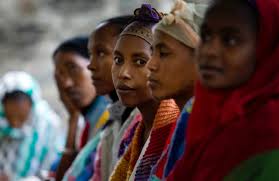Source: borgenmagazine.com
SEATTLE, Washington — Endometriosis is a debilitating, painful gynecological disease that affects women all over the world. Although this disease is thoroughly researched and documented in well developed, high-income countries, endometriosis is a forgotten and foreign disease in the developing world. There is a lack of knowledge and data concerning the disease, especially in sub-Saharan Africa. This absence of information is consequently leaving thousands of women experiencing the pain of endometriosis hopeless and lost. Endometriosis in sub-Saharan Africa has always been a problem, but only in recent years is it finally being acknowledged.
Endometriosis in Women
Endometriosis occurs when “tissue that is similar to the lining of the uterus grows in other places” throughout a woman’s body. This presents intense debilitating symptoms. Pelvic pain is the most common symptom, affecting 75 percent of women with endometriosis. Almost half of women will experience infertility. Other symptoms include problematic menstruation cycles, digestive issues and fatigue.
These symptoms can make it extremely difficult, if not impossible, for women to navigate everyday life. For women in low-income, impoverished countries, these symptoms make an already strenuous life that much more exhausting. Endometriosis significantly impacts women not only physically but also emotionally. This impact often leads to a decreased quality of life. For women that are already struggling to survive in poverty-stricken areas, a decreased quality of life is not something they can afford.
A Lack of Information
In the past, it was accepted that endometriosis simply did not affect women in low-income countries as much as it did in high-income countries. Many health professionals believed this was merely due to societal and cultural differences such as larger family sizes, shorter times between pregnancies and superstitious beliefs and attitudes surrounding women’s pain and menstruation.
As more studies are emerging, however, research is showing the lower prevalence of endometriosis in impoverished countries is due to the absence of properly trained health professionals and medical facilities. Without proper knowledge of endometriosis it impossible for women to be properly diagnosed. Without a diagnosis, these women will not know to seek and attain the treatment they need. Thus, there is an immediate and dire need to further research endometriosis in sub-Saharan Africa in order to give these women a fighting chance.
What Research Has Found
Though there is limited research on endometriosis in sub-Saharan Africa, the studies that have been performed confirm the growing suspicions that endometriosis is just as present in impoverished areas as it is in high-income countries. A 2015 study on the presence of endometriosis in Nigerian women found that more than 48 percent of the 239 women analyzed had damage and lesions from endometriosis.
Another study in Ghana reported that health professionals identified 12 case reports of Thoraxic endometriosis Syndrome between 2004 and 2012. This is a phenomenon where endometriosis infects and damages the lungs. Furthermore, infertility after a first-born child affects more than 30 percent of women in sub-Saharan Africa. Studies have shown that up to 50 percent of the cases of women experiencing infertility are due to endometriosis.
Banding Together
Despite the lack of information and research surrounding endometriosis, many women in Africa know of its harsh reality. These women are gathering together from various parts of the world, sharing stories and support through social media and different organizations. Organizations like the World Endometriosis Organisations (WEO) provide websites and hotlines where women can turn for support and information. They exist in countries such as Ghana, Nigeria and South Africa.
One such organization, Endo Charity, is based out of Ghana and was created in 2019. Their goal is to raise awareness of endometriosis and improve care for women afflicted with the disease. This organization hosts events advocating for endometriosis awareness. It also provides women with the chance and opportunity to reach out and receive help when everywhere else they turn is lacking help and information. In Nigeria, the EndoSurvivors International Foundation is also working to spread awareness to the public and medical professionals.
Women are clearly suffering from endometriosis in sub-Saharan Africa. Studies are providing evidence of the severe presence of endometriosis throughout the continent. Endometriosis exists in low-income countries, and this research is the first step in the journey of improving the lives of women in sub-Saharan Africa. Thankfully, these organizations are spreading awareness of the chronic condition. Supporting organizations that educate and support women as well as educate health professionals about the existence of this disease is the first step to ending the suffering of these African women.
